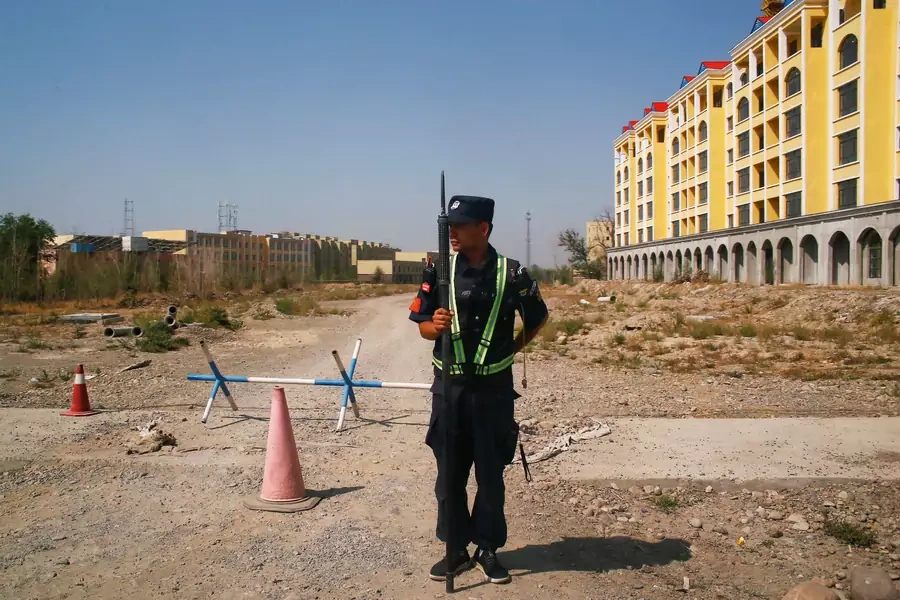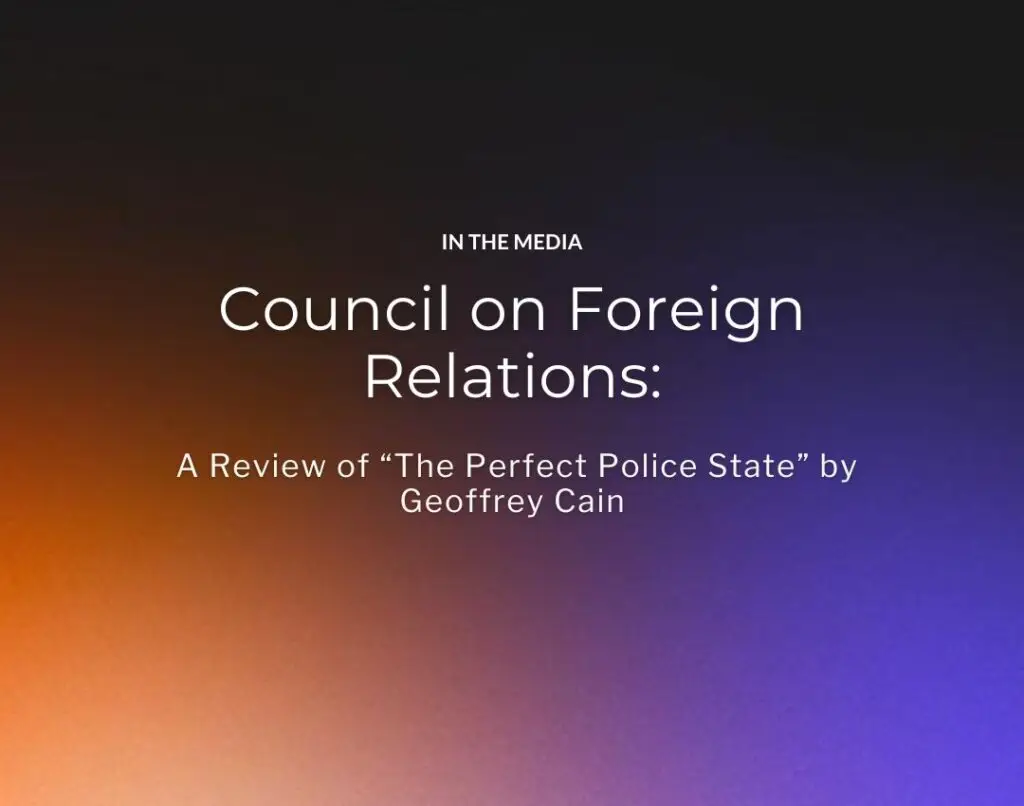Cain delineates two narratives that gradually intertwine: One is China’s drive for technological dominance. The other is China’s fumbling effort to define and defeat an internal enemy of its own creation.
By Eric Schluessel
Council on Foreign Relations: Asia Unbound
Published June 10, 2021

The Xinjiang region of northwest China (or East Turkestan) is the homeland of the Uyghurs, a group numbering roughly eleven million people. Uyghurs speak a language closely related to Turkish, generally practice Islam, boast a history of political independence, and otherwise have a broad range of cultural practices that distinguish them from the majority Han Chinese. Since 2017, thousands of eyewitness reports and leaked official documents have emerged that attest to an ongoing effort on the part of the People’s Republic of China to quell dissent in the Uyghur homeland through detention, incarceration, and a now-pervasive network of surveillance. They describe a system of reeducation camps, which the Chinese government insists are merely mandatory boarding schools, where many Uyghurs, Kazakhs, and others deemed deviant, including some Han Chinese, are sent to be “cured” of their ideological diseases. Some characterize this as a systematic effort to eliminate not just dissenting voices, but an entire way of life—a genocide, powered by cutting-edge technology.
Crimes against humanity tend imply the existence of a criminal mastermind who could someday be put on trial. However, in The Perfect Police State: An Undercover Odyssey into China’s Terrifying Surveillance Dystopia of the Future, journalist Geoffrey Cain demonstrates that no single architect designed this system. Rather, we are presented with an indictment of unfettered state power and the unethical pursuit of profit, told through the intimate stories of eyewitnesses.
Cain delineates two narratives that gradually intertwine: One is China’s drive for technological dominance. The other is China’s fumbling effort to define and defeat an internal enemy of its own creation. Ethnoreligious oppression in Xinjiang and the effort to create an all-encompassing system of digital surveillance grew together haphazardly in the hands of security-obsessed officials and amoral executives, while ordinary people paid the price.
Uyghurs’ own stories are at the core of this book, and Cain’s chief interviewees, out of a sample of 168, are a surprising mix of well-informed insiders. We meet a former IT worker who helped create the surveillance system; a onetime spy for the Chinese; and the most sympathetic and central figure, a young, bookish woman named Maysem who simply wanted to finish her degree.
Maysem’s journey guides us through the system of reeducation that quickly encompassed her whole life in and beyond China. When we meet her, Maysem is a thoughtful young woman and former student of imprisoned Uyghur scholar Ilham Tohti, now studying abroad. Maysem returns to China and faces arbitrary bureaucratic bungling that suddenly lands her in a camp, facing beatings and mind-bending interrogations. Like any clever abuser, China has learned not to leave too many marks on its victims, but instead to chip away at their grasp on reality and sense of self-worth. Maysem recounts the effects of reeducation on her psyche as she was forced to deny her own senses and internalize the state’s demands on her thoughts and comportment.
The Perfect Police State helps us understand how this kind of arbitrary violence came about through a story about technological innovation bereft of ethical guidance. In the 2000s, the Chinese state realized that, despite all outward claims to totalitarian omniscience, it did not actually know itself very well. Cain’s interviews with Irfan, the Uyghur IT worker, show how Xinjiang for many years was the testing ground for piecemeal systems of surveillance that gave the illusion of control. Those attempts at discipline accompanied a push for economic development that left Uyghurs behind and the implementation of ill-considered and divisive policies aimed at cultural assimilation.
The deadly July 2009 protests and backlash, which began as peaceful protests against cultural restrictions and economic inequality, could have prompted Chinese leadership to reverse their most arbitrary and divisive policies. Instead, they made increasingly ham-handed and invasive interventions in Uyghur communities and families. These interventions focused on rooting out what the state perceived to be Islamist “extremism,” which in most cases meant criminalizing ordinary Islamic practices. Scholars such as Sean Roberts have argued that China created a “self-fulfilling prophecy” in which the determination to locate and punish terrorists instead led to more discontent and, eventually, actual terrorist attacks.
As the perceived threat increased, so did securitization, which in turn produced new threats and the demand for better intelligence and more powerful computers to counter them. Nevertheless, the state’s ability to surveil remained limited. Even as video cameras and checkpoints multiplied across Xinjiang, the information they collected was not integrated into a single network.
That changed around 2016 with a shift in Chinese thinking about Xinjiang and its people. Previously, the government had focused on economic development as a means to achieve stability in what it had long regarded as a “restive” region. Now Chinese President Xi Jinping and other leaders finally realized that economic development, which overwhelmingly favors Han Chinese settlers, was not winning hearts and minds. (This is to say nothing of the Xinjiang Production and Construction Corps, or bingtuan, a massive pseudo-military corporation that exists in Xinjiang but is governed separately.)
However, rather than remedy the underlying sickness in Xinjiang—the inequality and discrimination that caused the most discontent—they identified Islamist extremism as a “virus” of which Uyghurs, Kazakhs, and others needed to be cured in order to become “normal people.” That is, a primarily socioeconomic problem was treated as an ideological and cultural problem, a drive, as it were, to “kill the Uyghur, save the man,” that often confuses religion and culture. According to government documents, the symptoms of “extremism” include a broad range of mostly innocuous practices that may or may not have any relation to religion per se. Indeed, the interpretation of “Islamic extremism” reflects a suspicion towards any behaviors that are perceived to deviate from Chinese norms. In The Perfect Police State, for example, Maysem is found suspicious because she enjoys reading and pursues an education in Turkey. The result is the criminalization of ordinary Uyghur and Kazakh cultural practices.
Regardless, treating the “virus” required identifying and isolating the patients. Chinese companies and global capital provided the means to do so as their “patriotic” competition for market share and government contracts produced more refined technology, such as facial recognition software and new kinds of cameras. Cain is an experienced business journalist, and he interviewed executives at such globally recognized corporations as Huawei, as well as lesser-known but key players, such as Megvii, SenseTime, and Hikvision, who produced the key components of the new surveillance state. In 2016, cutting-edge advancements in neural networks finally made it possible to integrate those disparate technologies into a single system: the Integrated Joint Operations Platform (IJOP). The IJOP could combine biometric data with masses of other information to track, monitor, and identify potentially deviant behavior.
The IJOP is intended as a “Minority Report”-style system to identify future criminals. Yet, Cain demonstrates, it even fails in that respect. The platform was trained on data from human beings, a system of nosy neighborhood monitors who tracked changes in people’s schedules and habits. Their reports in turn were driven by vague political directives issued by overambitious officials, who set strict quotas requiring them to identify certain numbers of potential terrorists. This targeted tool for surveillance and discipline, trained on bad data, created the dragnet that detained an estimated 10 percent of the Uyghur population. Even members of loyal and “good” families such as Maysem’s were labeled enemies of the state. Reports demonstrate that many senior citizens have been sent for “job training” at reeducation centers, while longtime Chinese Communist Party members, including many cadres and secular academics, were sentenced to prison or even death on absurd charges of extremism.
Cain’s story thus seems to prove the programmer’s adage: “Garbage in, garbage out.” The IJOP provides not omniscience, but the illusion of control as defined by an ignorant machine. Predictive policing in the United States is correctly found to reinforce racial prejudices in policing—we should expect no less in China, where several companies have offered the government facial recognition software that purports to identify Uyghurs automatically. At the same time, some Uyghurs themselves draw parallels with the Cultural Revolution, when people scrambling to display their loyalty to Mao Zedong reported others for fictional thought crimes.
While it would be reasonable to assume that China is deploying arbitrary punishment strategically in order to create an atmosphere of paranoia, Cain is careful not to ascribe precise motivations to leaders without textual evidence. Rather, the book presents a tragedy of errors, a series of unforced mistakes driven by ideology as, at every step, people in power strengthened their commitment to bad policy. Scholars often analyze China’s bungling in Tibet and Xinjiang as a product of bad incentives that lead to perverse implementations of directives from the top. However, as the former spy recounts, officials in Xinjiang increasingly bought into their own paranoid propaganda and began to see enemies everywhere, which the IJOP obligingly served up. This result was, frankly, predictable.
In this way, The Perfect Police State presents a lesson about the amoral pursuit of profit, as companies fulfilled state demands without considering the human consequences or even their products’ effectiveness. One interviewed executive declared, “First we need to survive as a business, and then we can build our moral values.” Pursuing government contracts is not only a priority for these companies, but something that the state can demand of them, and this “non-political” stance serves their bottom lines. Cain points to a number of international companies, from venture capital to biotech, who have similarly involved themselves in Xinjiang by providing investments and technology.
Some of those international corporations withdrew from the abuse of surveillance technology or suspended their operations in light of human rights concerns. While that is laudable, we ought to be troubled that privacy and freedom depend to such a great extent on companies choosing to act against their self-interest. Ultimately, the international community is recognizing that one of the few effective means to address the situation in Xinjiang is to pressure businesses who may be entangled in the region’s surveillance and reeducation system, or with the forced labor that some Chinese companies evidently source from the camps. The Perfect Police State provides a partial map to that tangled web.
Meanwhile, however, The Perfect Police State reminds us that Maysem’s story is far from unique. Cain points to others who have recorded countless eyewitness reports, such as the international Uyghur activist Abduweli Ayup, who introduced most of the book’s interviewees to him, or the Kazakh activist Serikzhan Bilash. People have shared their stories for four years, first in whispers, then in a torrent that has not abated. It is time that the world simply listened.
Eric Schluessel is assistant professor of modern Chinese history at George Washington University.
See Also:





